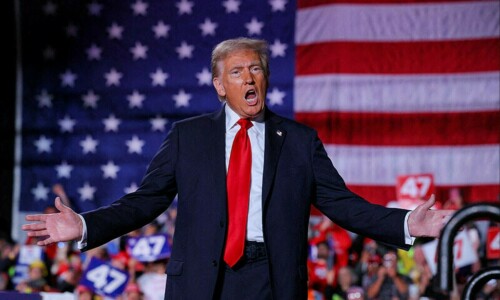U.S. President Donald Trump announced on Friday that he had ordered two nuclear submarines to be positioned near Russian territories in response to what he called “provocative and inflammatory” remarks by former Russian President Dmitry Medvedev. In a post on Truth Social, Trump said, “Words are very important, and can often lead to unintended consequences. I hope this will not be one of those instances.” He did not clarify whether the submarines were nuclear-powered or nuclear-armed, nor did he disclose their exact location, which remains classified by the U.S. military.
The statement came as tensions continued to rise between the United States and Russia over the war in Ukraine. Medvedev, who currently serves as deputy chairman of Russia’s Security Council, recently dismissed Trump’s ceasefire ultimatum and referenced Russia’s nuclear strike capabilities in a social media exchange. Trump had earlier given Russia “10 days” to agree to a ceasefire in Ukraine or face tariffs, including against nations buying Russian oil. Moscow has shown no indication it will comply with Trump’s deadline, sticking to its own terms for ending the war.
Medvedev responded to U.S. pressure by accusing Trump of playing a “game of ultimatums” and insisted negotiations would only end once Russia achieved its military objectives. He taunted U.S. leaders by writing, “Work on America first, gramps!” on social media. Western officials have often dismissed Medvedev’s inflammatory remarks, but some diplomats believe they reflect sentiments within the upper echelons of the Kremlin.
Russian President Vladimir Putin, speaking earlier in the day, maintained that Russia was open to continued negotiations but said the war’s momentum currently favours Moscow. He dismissed public pressure and emphasized the need for private, detailed conversations to make progress. Putin reiterated that Russia’s troops are advancing along the front lines and claimed to have captured the Ukrainian town of Chasiv Yar after a prolonged battle, a claim Kyiv denies.
Meanwhile, Ukrainian President Volodymyr Zelensky repeated his call for direct talks with Putin, stating that real peace discussions could only happen at the leadership level. “The United States has proposed this. Ukraine has supported it. What is needed is Russia’s readiness,” Zelensky said. Russia responded that such a meeting would only occur after negotiators reached a comprehensive agreement.
On the ground, the human cost of the war continued to rise. Ukrainian authorities concluded a 24-hour rescue operation in Kyiv following one of Russia’s deadliest airstrikes this year. At least 31 people, including five children, were killed after more than 300 drones and multiple missiles struck the capital early Thursday. The worst damage occurred in the Sviatoshyn district, where a residential building partially collapsed.
Rescue crews recovered more than a dozen bodies overnight as residents gathered to mourn, leaving flowers, candles, and stuffed animals at the makeshift memorial site. Among those grieving was 43-year-old Oksana Kinal, who lost a co-worker and her child in the blast. She expressed cautious hope that Trump’s threats might change Russia’s behaviour but questioned whether Putin would listen. Nearby, 65-year-old Natalia Matviyenko expressed skepticism, saying Trump’s tough talk had yet to yield results.
Trump, who returned to office on a pledge to swiftly end the war in Ukraine, has recently abandoned his earlier conciliatory stance toward Moscow. He has pledged harsher sanctions and signalled greater willingness to arm Kyiv. His administration’s frustration with Russia’s conduct has grown in recent weeks, with Trump describing Russia’s latest missile attacks as “disgusting” and accusing Putin of spreading “bullshit.”
The diplomatic deadlock persists, with Russia refusing to scale back its military operations and Ukraine insisting it will not accept a pause disguised as a peace deal. Prime Minister Yulia Svyrydenko stated on Friday that the global community possesses the tools needed to hold Russia accountable, but what is lacking is the political will. As Trump escalates pressure with threats of sanctions and military posturing, questions remain about how far each side is willing to go—and whether a breakthrough is possible amid growing casualties and hardened rhetoric.

